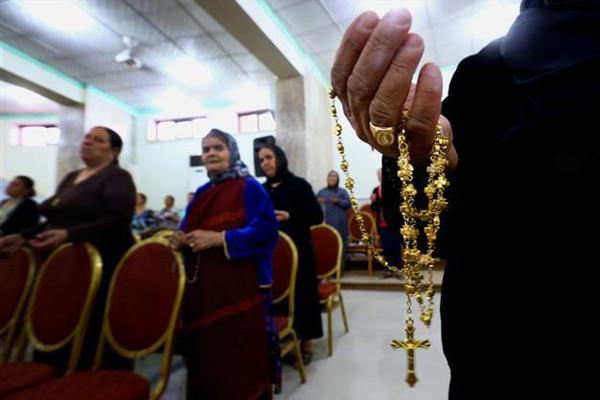Jihadists claim Baghdad blasts as Iraq rallies behind Christians
BAGHDAD - Agence France Presse


In this Saturday, July 19, 2014 photo, displaced Christians who fled the violence in Mosul, pray at Mar Aframa church in the town of Qaraqoush on the outskirts of Mosul, Iraq. AP Photo
The Islamic State on Sunday claimed responsibility for deadly Baghdad bombings, as the Christians they drove out of Mosul grieved for their lost homes and uncertain future in Iraq.The flight of the centuries-old Christian community from Iraq's jihadist-held second city drew messages of solidarity and pledges of aid, both from former Sunni neighbours and Shiite leaders.
In a statement posted on jihadist websites, the Islamic State (IS) praised two of its fighters -- a German and a Syrian -- for two of a spate of blasts that killed 24 people in Baghdad on Saturday.
"Two knights of the knights of Islam and heroes of the caliphate were launched, Abu Qaqa al-Almani and Abu Abdulrahman al-Shami, to destroy checkpoints" manned by soldiers, police and allied Shiite militiamen, it said.
The near-simultaneous blasts were among the deadliest attacks in Baghdad since IS conquered large swathes of territory last month, exacerbating sectarian tension and pushing Iraq to the brink of breakup.
The Christian's eviction from Mosul was just the latest mass displacement in years of violence that have redrawn Iraq's ethno-sectarian map.
"We don't know what we're going to do or what will happen to us. Will we ever to return to our homes? Will the government rid the city of terrorists?" asked Umm Ziyad, 35.
She fled Mosul on Friday with her four children and now shares a house still under construction with several other displaced families in the Christian town of Qaraqosh, 32 kilometres (20 miles) east of Mosul.
According to clergy leaders, several thousand Christians fled Mosul on Friday and Saturday following an ultimatum by the city's new rulers to convert, pay a special tax, leave or face execution.
Chaldean patriarch Louis Sako said there were still around 35,000 Christians in the city before the IS launched a sweeping offensive on June 9, proclaimed a caliphate and made Mosul their main Iraqi hub.
He said all had left the city by the time the noon ultimatum expired on Saturday. A rare Christian who decided to stay was fatalistic: "I already feel dead," he told AFP.
Many residents of Mosul are afraid to speak and press access is almost impossible, but Sunnis in the city have voiced sympathy for their former Christian neighbours.
"We consider it unfair and against the principles of Islam," a Mosul resident told AFP by phone.
"Christians have lived in Mosul for more than 1,000 years and most of them were top people: doctors, engineers and artists. Their departure is a huge loss for Mosul."
Prime Minister Nuri al-Maliki in a statement condemned the eviction of Mosul's Christians and urged the world to stand united against the Sunni jihadists that his army and allied militias are struggling to contain.
IS threats against religious minorities in the area "reveal without any possible doubt the criminal, terrorist nature of this group, and the danger it represents to humanity and centuries-old heritage," he said.
Political leaders in the Shiite holy cities of Karbala and Najaf, both already crumbling under the burden of Shiite refugees forced from their homes over the past six weeks of fighting, said their doors were also open to displaced Christians.
Ahmed Chalabi, another prominent Shiite politician seen as one of Maliki's main challengers for the job of prime minister, argued that the government was to blame for the country's worst crisis in years.
"Iraqi Christians are an integral part of the Iraqi people and have been present in this land for more than 1,600 years," he said in a statement.
"The current government of Iraq has failed in its duty to protect Iraqi citizens," he said, urging parliament to swiftly elect a new president and form a government capable of saving Iraq's integrity.
A day after President Jalal Talabani returned from 18 months of medical treatment in Germany to serve out the last few days of his tenure, the names of those who will compete to replace him were due to be announced.
An unofficial power-sharing deal means the job is usually reserved for a Kurd.
While no consensus has emerged, veteran former Kurdish premier Fuad Masum increasingly appeared the most likely to be acceptable to all sides.
